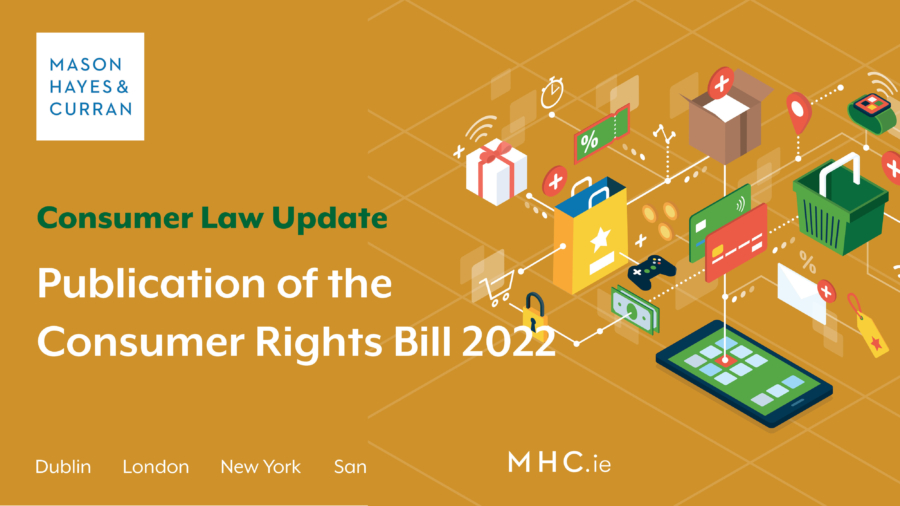Publication of the Consumer Rights Bill 2022

The Irish Government published the Consumer Rights Bill 2022 on 22 April 2022.
The Bill, when it comes into effect, will make widespread changes to consumer protection laws in Ireland and align them more closely with rules across the EU. It will create clearer rules for businesses but will introduce new obligations on traders selling to consumers. It will also strengthen the remedies available to consumers and increase the penalties for traders that breach the law.
The Minister of State with responsibility for Consumer Protection legislation, Robert Troy TD previously described it as “the biggest overhaul of consumer rights law in 40 years… modernises and consolidates existing consumer protection law and significantly strengthens the enforcement powers of [Irish] agencies responsible for ensuring consumer rights...”
The Consumer Rights Bill 2022, when it comes into effect, will implement each of the following EU Directives:
- The Digital Content Directive
- The revised Sale of Goods Directive, and
- The Omnibus (or “Modernisation and Enforcement”) Directive which itself amends:
- Unfair Contract Terms Directive
- Unfair Commercial Practices Directive
- Consumer Rights Directive
- Price Indication Directive
As the Omnibus Directive updates and strengthens four existing consumer protection laws, the combined effect of these legal changes is that traders will have six strengthened or new laws to comply with, depending on what goods or services the trader sells, and whether online and/or offline.
The most significant effect of the Omnibus Directive, and therefore the Consumer Rights Bill 2022, is the increased enforcement powers. These powers include increased penalties for widespread breaches of the laws of up to 4% of turnover in the relevant Member State or Member States, or up to €2 million.
Overview of changes under the Consumer Rights Bill 2022
We outline the changes to Irish consumer law proposed by each part of the Bill.
Part of Bill |
Implements/Affects |
Part 1 - Preliminary |
|
Part 2 – Sales Contracts |
Directive 2019/771 – the revised Sale of Goods Directive |
Part 3 –Digital Content Contracts and Digital Services Contracts |
Directive 2019/770 – the Digital Content Directive |
Part 4 – Services Contracts |
Amends Part IV of the Sale of Goods & Supply of Services Act 1980 (non-digital services, in respect of consumers) |
Part 5 – Consumer information and cancellation rights |
Replaces the Consumer (Information and Cancellation Rights) Regulations 2013 (SI 484 of 2013) and implements updates from the Omnibus Directive |
Part 6 – Unfair terms in consumer contracts (& list in Schedule 5) |
Replaces Unfair Contract Terms Regulations (SI 27 of 1995) & amends with updates from the Omnibus Directive |
Part 7 – Proceedings & Penalties |
Re offences, prosecuting authorities, fines, and provisions from CPA (updated for the Omnibus Directive) |
Part 8 - Amendment of the Consumer Credit Act 1995 |
Extensive additions to the 1995 Act for consumer hire-purchase agreements |
Part 9 – Amendment of the Consumer Protection Act 2007 |
Re the Unfair Commercial Practices Directive & implements updates from the Omnibus Directive |
Parts 10 to 12 – Amendments of the Central Bank Act 1942, the Communications Regulation Act 2002 and the Competition and Consumer Protection Act 2014 |
Mostly technical amendments to refer to the Consumer Rights Bill 2022 |
Part 13 – Minor and Consequential Amendments (& Schedule 6) |
Amends Sale of Goods Acts 1893 & 1980 & SI 14 of 2020 re fines |
The Consumer Rights Bill will repeal several existing pieces of Irish legislation, including:
- Parts of the Sale of Goods & Supply of Services Acts 1893 & 1980
- Part of the Package Holidays and Travel Trade Act 1995
- Parts of the Consumer Credit Act 1995
- All of the Unfair Terms in Consumer Contracts Regulations
- All of the Consumer Goods and Associated Guarantees Regulations 2003
- All of the Consumer Information Rights Regulations 2013
- A section of the Arbitration Act 2010
- All of the Trading Stamps Act
and will amend:
- The Consumer Protection Act 2007
- The Sale of Goods & Supply of Services Acts 1893 & 1980
- The Acts referred to in Parts 10 to 12
- And the Cooperation Regulation 2020, by the addition of turnover based fines / €2million for widespread infringements (section 173(2) and Part 2 of Schedule 6)
It will introduce several enhanced statutory protections for consumers, including:
- New rights for digital content contracts, for example audio, video files and computer games
- New rights for contracts for the supply of services, for example streaming services, cloud computing and social media
- Rights where the consumer does not pay a monetary price but gives personal data that the trader can commercialise
- Consumers will be entitled to know whether the seller they are buying goods or services from on a platform, for example Ebay or Amazon, is a private seller or a trader
- An increased ‘black list’ of contract terms that are always unfair
- New enforcement powers for the Competition and Consumer Protection Commission (CCPC) to ensure consumer rights are upheld
Additionally, it will strengthen consumer rights relating to quality, fitness for purpose and other aspects of services. Consumers will have statutory remedies where services supplied by traders do not comply with the legal requirements. Traders should familiarise themselves with the additional obligations placed on them in respect of sales to consumers.
Tips for Traders |
|
|
|
|
Enforcement powers in Ireland
The CCPC will also gain new enforcement powers regarding traders who infringe the law, with radically increased penalties available for prosecutions of EU-wide infringements. As required by the Omnibus Directive, GDPR style fines will apply to EU wide infringements of several parts of the proposed Consumer Rights Bill. These fines will be up to 4% of the trader’s annual turnover in Ireland and relevant Member States, or up to €2 million.
Collective Redress and Representative Actions
On 22 March 2022, the Irish Government approved the drafting of legislation to transpose the EU Directive 2020/1828 on representative actions for the protection of the collective interests of consumers (EU Directive on Representative Actions). This is effectively an EU-style of class action, which will be available for losses suffered by consumers arising out of breaches of over 60 existing EU Regulations and Directives.
The EU Directive on Representative Actions was published on 4 December 2020. Ireland and the other Member States are required to adopt implementing measures by 25 December 2022 and the measures will apply from 25 June 2023.
Once it comes into effect by national legislation, the EU Directive on Representative Actions will harmonise the regime for collective actions to be brought on behalf of EU consumers. It also aims to balance the availability of the mechanism across Member States while providing safeguards to prevent frivolous claims against traders as detailed in our previous article available here.
What’s next?
The Consumer Rights Bill 2022 will now need to go through each stage of the legislative process. However, once finalised and passed, Irish consumer law will be radically overhauled, obligations on traders will expand, and the penalties for certain infringements will radically increase.
Traders are advised to prepare for the introduction of this new law by considering the impact of the Bill, the changes that may be needed in their sales practices, and be ready to comply with the Bill as soon as it comes into effect. There is likely to be only a short lead in time for compliance with the new law, as the deadlines under the EU Directives are 1 January 2022 and 28 May 2022.
For more information on the likely impact of this development on your business, please contact a member of our Product Regulation & Consumer Law team.
The content of this article is provided for information purposes only and does not constitute legal or other advice.
Share this:




